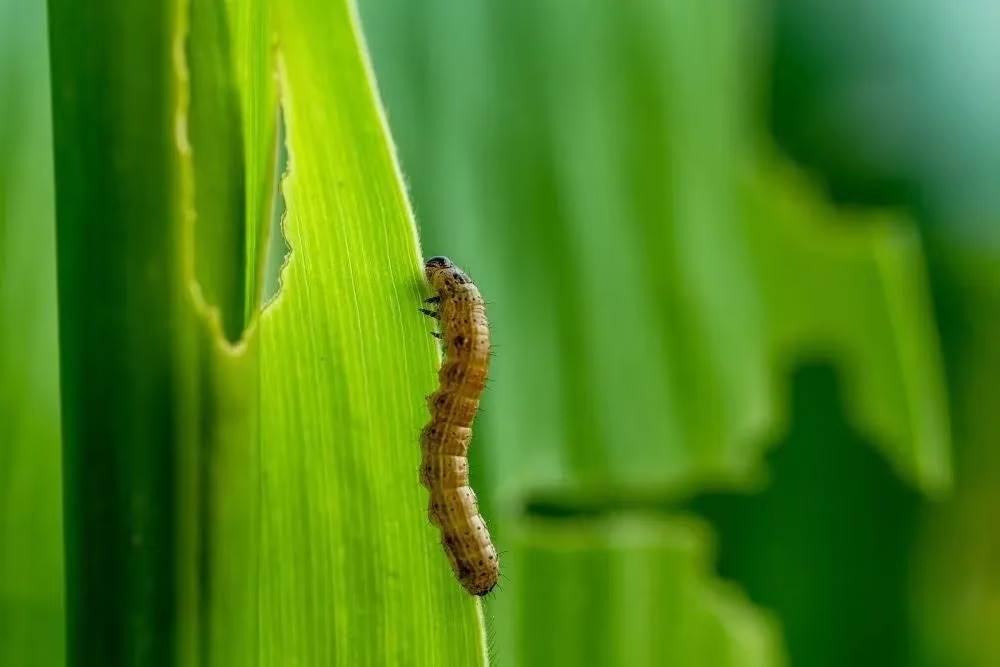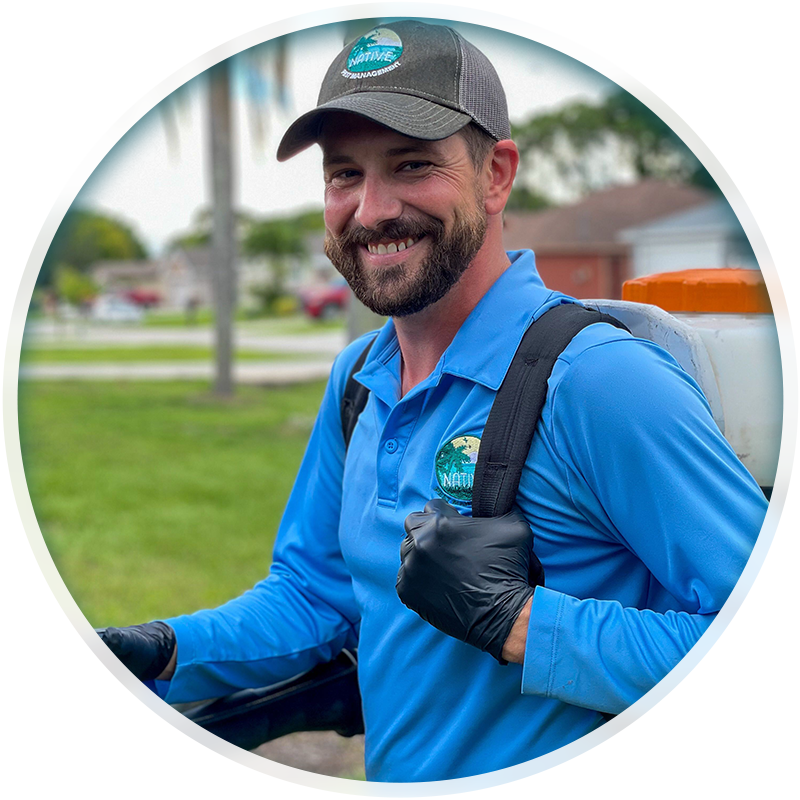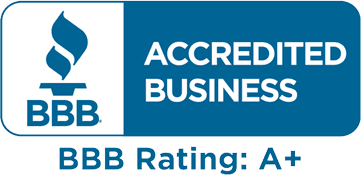
Fall Armyworm Identification In Florida
Identifying Fall Army Worms in Florida

Are fall armyworms giving you trouble? You’re not alone. These Florida pests are a rising concern for both home gardens and commercial agriculture. Knowing about their biology and behavior is key to tackling this challenge. This blog post will walk you through identifying and managing these pesky invaders effectively.
Key Takeaways
- Early identification of fall armyworms, such as through the Y-mark on caterpillars, is crucial for timely management.
- These pests significantly damage Florida crops, including corn and cotton, and turfgrass like bermudagrass.
- Pest management combines chemical methods, natural predators, and practices like garden cleanliness and monitoring.
- Consistent monitoring and responding to weather-related behavior changes are vital in mitigating armyworm infestations.
Biology and Identification of Fall Armyworms
Life Cycle and Development
Fall armyworms, a significant pest in Southern Florida, have a unique life cycle and distinct physical traits that are key to their identification and management:
- Eggs: The life of a fall armyworm begins as a tiny egg, usually white to light brown. Female moths lay eggs in large numbers on the leaves of plants, often covered with a protective layer of scales from their body, giving the egg mass a fuzzy appearance.
- Larvae (Caterpillars): Once hatched, the larval stage begins. These caterpillars are initially light in color but can range from green to dark brown as they grow, with noticeable stripes along their body. A key identifying feature is the light-colored, inverted Y-shaped mark on their head, a unique signature of the fall armyworm larvae.
- Pupa: After feeding and growing for several weeks, the larvae enter the pupa stage, transforming into a reddish-brown cocoon-like form, usually hidden in the soil. This is a transitional phase where they develop into adult moths.
- Adult Moths: Emerging from the pupae, the adult moths have a 1.25 to 1.5-inch wingspan. Their forewings display mottled gray, brown, or black patterns, while the hindwings are lighter. A distinctive white mark near the tip of the forewing is often noticeable.
In the adult stage, fall armyworm moths (spodoptera frugiperda) become key spreaders of infestations due to their ability to fly long distances. Their short lifespan and high reproductive rate make timely control essential.
Targeting this stage with specific measures like pesticides can greatly reduce their spread, protecting your and Southeast Florida’s crops and lawns from severe damage.
-
Do mosquito control services work?
When you choose to have professional mosquito control performed on your property, you will see a dramatic reduction in the mosquito populations around your yard.
By maintaining monthly treatments, these results will continue. We are so confident in the effectiveness of our mosquito control programs that we guarantee them with free follow-up treatments if needed in-between regular services.
-
How do you control mosquitoes in the yard?
At Native Pest Management, our technicians start their mosquito control service by inspecting your landscape for standing water. We then treat the standing water we find every month with biological larvicides to prevent mosquitoes from breeding.
Then, we perform a pet safe mosquito misting of the landscape to eliminate adult mosquitoes and prevent mosquitoes from finding harborage in your landscape. This guaranteed service should last approximately 30 days.
-
Can pest control get rid of mosquitoes?
No pest control treatment will eliminate every mosquito on your property.
However, with our two-step mosquito control service, we have been told by product manufacturers to expect a 90% reduction in the mosquito population.
Since we believe in the effectiveness of our mosquito control programs, we guarantee them with free follow-up treatments if needed in-between regular services.
Impact on Agriculture and Turfgrass
Florida is amongst the top states when it comes to researching bug-related issues. And in Florida, the presence of fall armyworms has become a growing concern due to their extensive damage to both agricultural crops and residential lawns. These pests, known for their voracious feeding habits, can quickly turn lush greenery into devastation areas.
Damage to Crops
Fall armyworms primarily target a variety of crops, causing significant yield losses and economic impact. The most affected crops include:
- Corn: They chew through leaves and can devastate cornfields.
- Cotton: Leaves and bolls are both at risk of damage.
- Peanuts: Armyworms can strip the foliage, affecting the plant’s growth.
- Sorghum, Rice, and Soybean: Leaves and stems of these plants are often heavily damaged.
- Vegetable Crops: A range of vegetables can suffer from their feeding, impacting both commercial and home gardens.
Damage to Turfgrass
Beyond crops, fall armyworms are notorious for damaging lawns, particularly bermudagrass, which is widely used in Florida for residential lawns, golf courses, and sports fields. The caterpillars feed on the grass blades, leaving behind brown, barren patches. This affects the lawn’s appearance and can weaken the turf, making it more susceptible to other pests and diseases.
The last thing you want is for these moths to undo all the strenuous lawn care that goes into it.
Management and Control Strategies
Effective pest control for fall armyworms requires a multifaceted approach that combines various strategies. These methods range from chemical controls to biological tactics and cultural practices, focusing on strategies that are also feasible for home gardens.
Chemical Control
Insecticides play a crucial role in controlling fall armyworm populations. When using these products, it’s essential to:
- Choose the Right Insecticide: Options like Bacillus thuringiensis (Bt), a bacteria-based insecticide, are safe for non-target organisms. Other effective choices include Spinosad and various Pyrethroids.
- Follow Label Instructions: Always adhere to the guidelines for application to ensure safety and effectiveness.
- Apply at the Right Time: For maximum impact, apply insecticides when larvae are young and more susceptible to chemicals.
Biological Control
Leveraging natural enemies of fall armyworms can be an effective and environmentally friendly approach:
- Beneficial Insects: Parasitic wasps (like Telenomus remus and Trichogramma spp.) and predatory beetles can naturally reduce armyworm populations.
- Birds and Other Predators: Encouraging birds (e.g., with bird feeders) in your garden can help control the pest naturally.
- Microbial Agents: Use fungi (e.g., Beauveria bassiana) and viruses (e.g., nucleopolyhedrovirus) to control fall armyworms naturally.
Cultural Practices
Simple changes in gardening practices can also help prevent and manage armyworm infestations:
- Regular Monitoring: Regularly inspect your garden or crops for early signs of armyworms.
- Sanitation: Keep the area clean by removing plant debris and weeds, which can serve as breeding grounds for armyworms.
- Smart Planting: Planting early and choosing resistant varieties of plants can reduce the likelihood of severe infestations.
For homeowners, focusing on regular monitoring, maintaining garden hygiene, and using environmentally friendly options like Bt insecticides or encouraging natural predators can be particularly effective in managing fall armyworms in home gardens. Preventative pest control may be worth looking into as well.

Why Choose Native Pest Management?
We Exceed Customer Expectations
-
Pet Friendly & Environmentally ConsciousNative Pest Management applies our pest control products with the safety of your family and pets in mind! We also offer eco-friendly pest control to protect your family and the planet.
-
Local Service ProfessionalsSince 2015, we have served communities in West Palm Beach and all throughout South Florida. Our team is fully licensed, insured, and vetted.
-
On TimeOur team will not only arrive on time, but they’ll also go above and beyond when providing service. It’s what makes us one of the top rated pest control companies in Florida! We strive for complete customer satisfaction every time.
-
Get a 100% Free Estimate
Whether you currently have pests in your home or simply want to start professional pest prevention, take the first step to a pest-free life, and contact us today for your free pet-friendly pest control quote.
-
“Warren took his time with the servicing and was very knowledgeable! Exceptional customer service. I will be requesting him each time.”- Montiea Singletary
-
“Excellent service by Chino from Native Pest Management. Chino went above and beyond to make sure we understood everything about the service and kept us very informed during the process.”- Brand Gonzalez
-
“Truly professionals at what they do. very respectful very knowledgeable and great attitude.”- Jorge Acosta
-
“I called and spoke to the manager, who was polite and courteous, and even though it cost them money to come back out and spray, they did not charge me again, and I was very thankful.”- S. Williams
-
“Dale is the absolute best in the business of pests! My sister and I personally ask for him every single time because he always goes above and beyond.”- Zariah Graham
-
“The technician was very professional. He explained things thoroughly and put me at ease with what was about to happen in my home.”- Anthony Diaz
-
“Native pest management always exceeds my expectations! The people who answer the phone are so nice and accommodating and make scheduling a breeze! The techs are always so nice and do a great job.”- Michelle Cato
-
“Extremely impressed with the technicians I met today. Tony and Jamie. Very thorough and customer oriented. I am expecting great things for my trees and plants.”- Curt Kredo

Native Pest Management's Blog
Want all the latest news or updates? Browse through our blog to read our most recent posts and featured articles.







